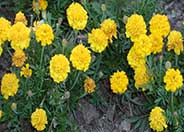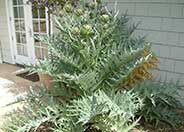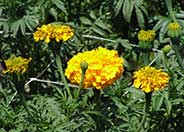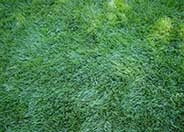
Common name:Iceland Poppy
Botanical name:Papaver nudicaule
This Iceland Poppy produces leaves that are divided with flowers, appearing on stems 1'-2' high. These flowers are cup-shaped to 3" across, and come in colors of yellow, orange, salmon, rose, pink and cream.

Common name:Beach Strawberry, Coastal Strawberr
Botanical name:Fragaria chiloensis
This perennial grows 4"-8" high with tooth-edged leaves and ornamental strawberries during the fall. Cut back or mow in early spring to encourage new growth.
Maintenance Tips
Fragaria chiloensis is a lovely ground cover that is also known as Coastal Strawberry. It is a very well-behaved ground cover, requiring very little maintenance to keep it looking and performing its best. It is best known for its berries which are very attractive to birds and other wildlife. The plant rarely grows taller than 4-6" and spreads out through its root system, creating a dense mat. The plant is susceptible to many types of fungi because of the moisture and the lack of airflow in its dense environment. Treating the plant with a systemic or topical fungicide may be necessary if the infection is killing the plant. Thatching the ground cover and drying the area out can help control fungal issues as well.
Common name:French Marigold
Botanical name:Tagetes patula
This plant will grow 1'-3' tall and has small, dark green leaves with gold, orange, and yellow flowers that bloom in the summer and fall.

Common name:Artichoke
Botanical name:Cynara scolymus
This perennial will grow 4' tall and 6'-8' wide. It has silvery green leaves with bluish purple flowers that bloom in spring. Artichoke is a favorite fruit/vegetable of California kitchens but it is a great ornamental plant often overlooked for color contrast. It is very tolerant of little water when planted for ornamental purposes.

Common name:American or African Marigold
Botanical name:Tagetes erecta
This Marigold will grow to about 3' high and has small, green or dark green leaves with orange, yellow, or white flowers that bloom in spring, summer, and fall.

Common name:Tall Fescue, Marathon (turf)
Botanical name:Festuca arundinacea 'Marathon'
This grass is best when kept at about 2"-2.5" high, but it has a root depth of about 6'. It is a beautiful, dark green color all year and is used in a variety of locations.

Common name:Mother of Thyme, creeping thyme
Botanical name:Thymus serpyllum
This attractive and reliable groundcover is so dense that it can smother out weeds. It reaches 3" tall and spreads 30". Leaves are tiny and dark green. Can tolerate some foot traffic. Tiny pink flowers appear in summer. This plant is great for a rock or Mediterranean style garden. It prefers full to part sun and has low water requirements once it's established. It will cover adjacent sidewalks and rocks. Bees love this plant too.
Maintenance Tips
Thymus serpyllum is a very low-growing, creeping plant. It is not used for culinary purposes but it makes an excellent ornamental ground cover. This is a very low-maintenance plant if it is planted in ideal conditions. It is drought tolerant and prefers full sun but can thrive in any soil condition. During the cooler, wetter months, the excess moisture can cause the plant to lose leaves and thin out. It is susceptible to root rot, mostly in the warmer months when people tend to overwater. If symptoms of root rot are present, stop watering and allow the soil to dry out. If the problem is killing off the plant, a systemic fungicide can be applied to treat the disease.
Common name:Daylily (hybrid selection)
Botanical name:Hemerocallis hybrids
These summer-blooming perennials form clumps with large, grass-like leaves. Its showy flowers, resembling lilies, are borne in clusters on stems held well above the foliage. Daylilies can be found in many colors: yellow, orange, red, purple, pink or multi-colored. Hemerocallis does better in well-draining soil and with extra summer water. Hemerocallis are very hardy,with few or none pests/problems.
Designer: DeeAnn Ayers
Photographer: GardenSoft
Maintain a two to four inch layer of mulch on the soil surface to reduce weeds, infiltrate rain water, and reduce compaction.
Mulching and adding compost to soil can minimize evaporation and help soil absorb and store water.
Remove irrigation water and fertilizer from areas where you don't want weeds to grow.